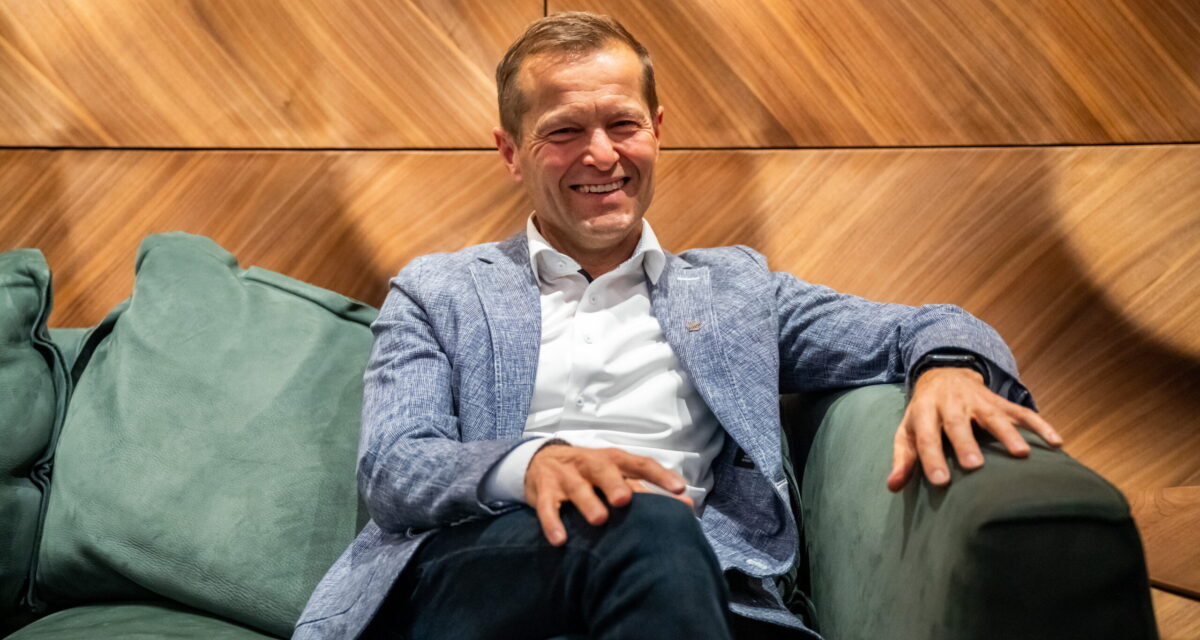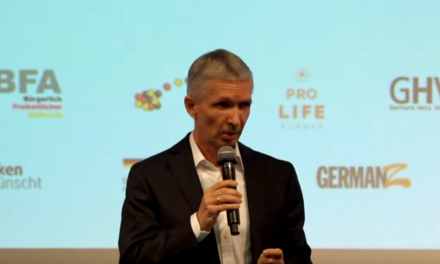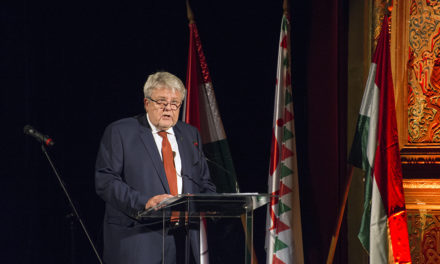It's like Hungarian science, it doesn't exist. There is universal science. According to Ferenc Krausz, it is really possible to analyze how much of the Nobel Prize Hungary has. According to him, it is huge, because if the teachers of Hungary had not instilled in him the need for knowledge, he would not have given his head to this field. The Nobel Prize-winning physicist would make history with the Molecular Fingerprint Research Center established in 2019. Interview.
Since 2015, he has been mentioned as one of the hopefuls for the Nobel Prize in Physics, but he was surprised when it turned out that he earned this recognition this year as one of the founders of attosecond laser technology. If the profession predicted this, why did it come as a surprise?
In recent years – in 2018 and 2022 – research related to lasers has been recognized. In August of this year, the Nobel Committee held a conference on the state of attosecond experiments - in relation to the latter, it is often said that such an event is used to test the given field of science - what it has achieved and what impact it has on other fields of science. I thought that the practitioners of attosecond physics would not receive a Nobel Prize for quite a few years. I was wrong. When the famous phone call came, I was in my pajamas putting together the slides for my afternoon presentation. I also considered not even answering the phone because I usually don't take calls from hidden numbers.
Last year, he received the Wolf Prize. That recognition did not have as much resonance as the Nobel Prize.
The Wolf Prize has a great reputation in the scientific community, it is referred to as the second most important award in physics, but it is almost unknown to the general public. No other recognition can be given to the profession or to the person on the street like the Nobel Prize.
Is it just a coincidence that Katalin Karikó and you are both born in a small country town?
This is irrelevant. This does not in any way follow that excellent researchers cannot come out of big cities. However, we have so much in common that we both learned early on that you have to earn your living by working. Which doesn't work without hard work, dedication and perseverance. I brought this with me from my parents' house.
Katalin Karikó's father worked as a butcher, while hers worked as a mason. That is, none of them started out with the advantages of being an intellectual.
Maybe that's why we got to where we are now. I assume that Katalin Karikó's parents also wanted their children to have a better turn than they had. Let them live more easily than they do, which they can achieve with greater knowledge. My parents did everything they could to create all the conditions for this for their two sons. It came at a price. We rarely saw my father, because he wore masks even on weekends so that we could have everything.
In high school, he was advised to like physics, but to have a profession that would provide a secure living. This is how he got to the Faculty of Electrical Engineering at the University of Applied Sciences. It was a good choice?
The rationality of my teachers led me to the field of electrical engineering. I listened to the advice, but it quickly became clear that my love for physics is much stronger than the amount of physics taught at the University of Applied Sciences. That is why I listened to the lectures of the world-famous György Marx at ELTE. At the same time, I consider it extremely lucky that I was a student of Károly Simonyi - he wrote the wonderful book A fizika cultural history - at the University of Applied Sciences. He was the one who was a huge motivating factor in my application to the University of Applied Sciences, since it was precisely because of his book that the professor was a concept among high school students as well. He was an individual whose work and personality went far beyond the walls of the university.
He graduated from the University of Applied Sciences in 1985, and then began his doctoral studies there. Meanwhile, he received a four-month scholarship to the Vienna University of Technology. What did he do in the Austrian capital that he was called to Vienna shortly after?
I went out hoping to get a whiff of the research there. This did not materially happen. I managed to get a laser working. After returning home, I continued my studies and experiments at the University of Technology. After the state exam, I started my doctoral studies - my scholarship was HUF 4,300, which was barely enough to live on. I was working, and all of a sudden the phone call came from Vienna: Arnold Schmidt, who had been appointed professor in the meantime, offered me an assistant position. I accepted, as the research conditions in Vienna were incomparably better than those at home. In experimental physics, we need the best possible instruments in order to be able to conduct world-class research. At the time, Hungary did not have the resources to purchase these instruments.
When did attosecond lasers appear in your life?
There were already significant Hungarian players in the field in the early 1990s, Csaba Tóth and Győző Farkas were among the first to predict the existence of attosecond light pulses. In the early 1990s, I was very satisfied with the fact that I could work with femtosecond laser pulses in Vienna - they were almost three orders of magnitude shorter than the ones I started working with in Budapest. At that time, titanium-sapphire lasers appeared, with which we produced short laser pulses like no other laser.
We quickly got to the forefront of the world, but after a while we couldn't move forward, we hit a wall. And that's when the solution came from Budapest - the so-called curved mirrors designed by Róbert Szipőcs and realized by Ferencz Kárpát.
With their help, by the end of 1993, it was possible to produce the first femtosecond laser that consisted solely of mirrors and the active (light-amplifying) medium. The technology spread rapidly in the world's laser laboratories and led to light pulses lasting only a few femtoseconds in a short time. These devices, discovered and developed in Hungary, cannot be missing from any state-of-the-art femtosecond lab on this planet today. On the night of September 10, 2001, another breakthrough came, followed by the sobering up the next day, because on that day the suicide terrorists destroyed the twin towers in New York.
What exactly happened?
In the early hours of the morning, it became clear that we had produced attosecond laser pulses. It was a great feeling, because we achieved what we set out to do five or six years earlier.
It is often asked what is the secret of whether or not a person achieves a goal? I think the main thing is whether we can move towards the set goal with the greatest possible consistency. Resisting the temptation to get involved in answering interesting questions that arise along the way that do not bring us closer to the big goal. Such a temptation is almost everyday, we were able to resist.
This was the reason for the production of the 650 attosecond laser pulse at that dawn. We went home dead tired and fell into bed. Around noon we returned and were confronted with what had happened in the United States. We have seen how quickly what was the center of our lives can become insignificant. Sometimes I wonder what's the point of fighting for a distant goal on a planet like this? Does this planet even have a future? This question can also be asked in connection with current events in Israel.
Does politics affect you?
Yes. Sometimes I imagine that if there really are extraterrestrials who might see us, what would they think of us humans? When they see that the leading powers of the world are only concerned with how to hinder the development of the other side? Does man even deserve to live long term on this planet? An extraterrestrial observer would hardly give a positive answer to this.
Does politics seep into the laser laboratory?
Naturally. Until a few years ago, I was able to employ Chinese students without any problems. At the beginning of this year, a young Chinese person applied to me. It met the requirements in every respect, but as a result of the American-Chinese confrontation, it is subjected to such strict security checks and thorough screening that it has had no results to this day. We cannot accept students not only from China, but also from other countries treated as enemies by the United States.
Talented young researchers from a significant part of the world cannot come to us because of the stupidity of big politics. They cannot do what I could do in 1987: I could go from Hungary to the other side of the Iron Curtain and work with the most modern tools.
He has been working at the Max Planck Institute for Quantum Optics in Garching since 2003, and holds the position of professor at the Department of Experimental Physics at the Ludwig Maximilians University in Munich. Why did you leave Vienna after 17 years?
It can be explained by similar reasons as when I moved from Budapest to Vienna. Munich provides researchers with a unique environment in Europe and worldwide. In addition to Germany's two largest universities, there are eight research institutes of the Max Planck Society in the city. A few hundred meters from us is the European Southern Observatory (ESO), one of the centers of space research in the world. General Electric's European research center operated here. A few examples of what an incredible intellectual center has been created in Munich. Such a concentration of knowledge was extremely attractive to me.
We wouldn't be in Hungary if there hadn't been suggestions about the extent to which the Nobel Prizes of Katalin Karikó and Ferenc Krausz can be considered Hungarian, since both have been working abroad for decades. How Hungarian is the Nobel Prize in physics?
It's like Hungarian science, it doesn't exist. There is universal science. It is really possible to analyze how much of my Nobel Prize is Hungary's share.
I think it's huge, because if the teachers in Hungary - from primary school to high school to university - hadn't instilled in me the need for knowledge, I wouldn't have put my mind to this career.
The stronghold of domestic laser physics is Szeged, where the globally envied laser center has been operating for years. Doesn't that mean enough to lure you home?
I work where I can do the most for science. I am convinced that I currently serve the interests of science and, through that, my country, best in Germany. The resources and opportunities in Munich are also useful for domestic science.
What can laser pulses be used for?
First, we proved that the technology works. It does exactly what we expect it to do. This was what the first decade after the discovery was all about. We then began to analyze what happens in solids, nanostructures, and molecules. The rapid spread of the new measurement technique is indicated by the fact that the number of references to articles published in the attosecond field reached hundreds in 2001–02, and already exceeded thirty thousand in 2017–18. In the mid-2010s, we embarked on something completely new: the medical diagnostic application of ultrafast measurement technology.
In 2019, the Molecular Fingerprint Research Center (Center for Molecular Fingerprint, CMF) was launched in Budapest with government support. What did you do?
We use very short infrared laser pulses to vibrate the molecules in the blood sample. The molecules emit infrared light, which is scanned and measured using a highly sensitive attosecond measurement technique. These infrared signals can provide a great deal of information about the molecular composition of the blood in that sample. This composition is changed by diseases. Current laboratory medicine only measures certain biomarkers, while the infrared light pulse measures many thousands of molecules, so it is possible to examine the blood samples and infrared fingerprints of subjects suffering from specific diseases. If the support of this program can be ensured in the long term and the researches bring the hoped-for results, then we can establish a new era. At the moment, we are talking about healthcare, while maintaining a disease case. We wait until people get sick and then try to cure them. Patients are also lazy in this regard, as they often do not go to the doctor immediately even with symptoms. In many cases, the diagnosis establishes a severe chronic disease at an advanced stage. When only the worsening of the condition can be stopped, sometimes not even that.
Our story is about how an illness can become a health issue. With our Health for Hungary – Hungary for Health (H4H) survey, in which ten thousand Hungarian citizens participate, it is also unique in the world
a collection of blood samples will be created that will be invaluable for validating any blood-based diagnostic method. Since there is no example of such an investigation in the world, we can write history. This is especially true if our method based on infrared fingerprints is successful in the early detection of serious chronic diseases.
If it comes in, it could revolutionize medicine and even bring another Nobel Prize…
The concept should be proven, the awards are secondary. Our goal is the early detection of serious diseases. The follow-up is on a decade scale.
He donated a significant portion of the money from his three most recent awards - the Wolf Prize, the Frontiers of Knowledge Prize and the Nobel Prize in Physics - to a foundation. What is the grant used for?
This foundation is Science4People, which I created with my colleagues. We are primarily trying to help refugees from Ukraine. We are renovating a school and bringing IT equipment to those in need. We contacted one of the Transcarpathian aid organizations. The essence of our new program, which started a few weeks ago, is to find teachers in the lower and upper grades of the region to tutor needy children. Hungarians and Ukrainians, natives and refugees alike. The first feedbacks are favorable. Later, we want to expand this initiative, we are collecting additional patrons for this.
He manages the work of one hundred and fifty people in Munich, Budapest and Szeged. Who can you count on?
The efficient operation of a community of this scale requires experienced colleagues to whom I can safely entrust any task. I have several colleagues like that. I make them aware that I count on them even at this level. In addition to creating research conditions, I have more time to find the right, forward-looking questions in my free time.
Could you give up the research?
No. This is my life.
Who will you invite to the Stockholm awards ceremony in December?
I would be happy to take my one-year-old and two-and-a-half-year-old grandchildren - together with the parents.
Featured image: MTI/Zoltán Balogh












